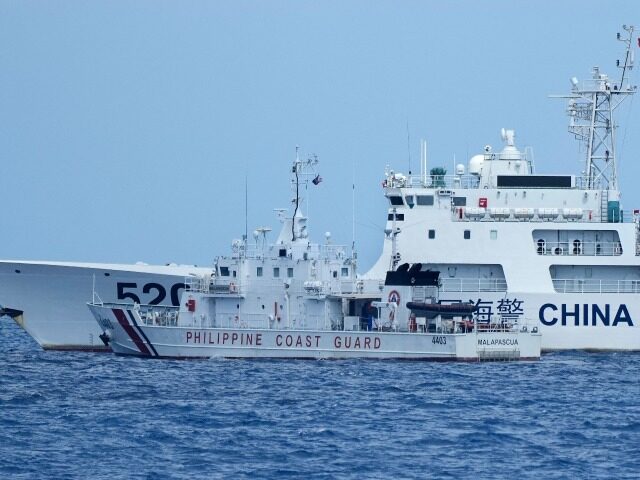A Philippine patrol vessel nearly collided with a Chinese coast guard ship near the Spratly Islands on Sunday, the latest in a series of incidents showing that the Philippines are standing up to Chinese territorial aggression.
The Sunday incident occurred while a literal boatload of international journalists was watching, having been invited on a tour of the Spratlys by the Philippine Coast Guard. Reporters watched as Chinese ships followed and harassed two Philippine ships over the course of six days, culminating in a Chinese ship violently maneuvering to block one of the much smaller Philippine vessels near Second Thomas Shoal.
“We would have collided on the bow had I not cut the engine and thrown it in reverse,” Rodel Hernandez, commander of the BRP Malapascua, told his passengers after the encounter.
Hernandez called it a “David and Goliath” showdown since the Chinese ship was over twice the size of the Malapascua. The two ships closed within 45 meters of each other during the encounter while more reporters watched from aboard another Philippine ship, BRP Malabrigo.
Second Thomas Shoal is part of an area claimed by both China and the Philippines, although it is much closer to undisputed Philippine territorial waters. Filipinos refer to the feature as Ayungin Shoal. It has been internationally recognized as a Philippine possession since 1999, when the Filipinos established a military base by the unusual expedient of ramming a decommissioned U.S. Navy ship called the Sierra Madre into it.
The Sierra Madre is still there, serving as home to a small force of Philippine marines. China periodically attempts to interfere with missions to reinforce or resupply them. In February, a Chinese vessel attacked the Malapascua with a military-grade laser while it was attempting to resupply the Ayungin garrison, temporarily blinding its crew members.
Hernandez told reporters he wanted them to see how Chinese ships behave aggressively in the region. When the Malapascua and Malabrigo announced their intention to conduct a “site survey” of Ayungin, the Chinese coast guard accused them of illegally entering Chinese waters and ordered them to leave.
Hernandez said the Chinese would take over Ayungin and turn it into one of their artificially enhanced, militarized island fortresses if Philippine forces did not “challenge their harassment.”
On Thursday, the Philippine Department of Foreign Affairs (DFA) said China’s harassment of the Malapascua and Malabrigo was “totally inconsistent” with international freedom of navigation.
“I would like to emphasize that the Philippines has the legal right to carry out routine maritime patrols in our territorial waters and (exclusive economic zone),” the DFA said.
“The China Coast Guard’s interference with this routine patrol mission was totally inconsistent with freedom of navigation, and a number of documented incidents also involved highly dangerous maneuvers that were contrary to standard navigational practices,” the statement added.
The Chinese Foreign Ministry dismissed the DFA’s complaint and insisted the Philippine ships were conducting a “premeditated and provocative action” by bringing journalists to the shoal.
“The Chinese coast guard vessel safeguarded China’s territorial sovereignty and maritime order, in accordance with the law, while taking timely measures to avoid the dangerous approach of Philippine vessels and to avoid a collision,” said Chinese Foreign Ministry spokeswoman Mao Ning, an entirely false characterization of the encounter according to the numerous international observers on the scene.
“It needs to be stressed that the Philippine vessels intruded into the waters with press staff on board. This makes it clear that it was a premeditated provocation designed to initiate friction, blame it on China and hype up the incident,” Mao claimed.
On Friday, the Philippine Coast Guard (PCG) published a report detailing even more aggressive and dangerous behavior by Chinese ships. The report said over a hundred “maritime militia” ships — essentially Chinese fishing boats with armed paramilitary crews — plus two Chinese coast guard ships and a corvette were observed in the Philippines’ exclusive economic zone during one recent patrol.
The PCG said it drove four of China’s maritime militia boats away from Pagasa Island, the second-largest island in the Spratly chain. The PCG has complained that the “unauthorized presence” of Chinese vessels within 12 nautical miles of Pagasa is “clearly inconsistent with the right of innocent passage and a blatant violation of the Philippines’ territorial integrity.”
Philippine lawmakers stepped up to denounce China’s aggressive behavior, including some who are normally seen as friendly to China.
“China’s aggressive actions based on its unfounded territorial claims not only heighten tensions between the two countries but, ironically, are being used to justify the increased military presence in the region of its big power rival, the United States of America,” said Teddy Casino, chairman of the Bagong Alyansang Makabayan (“New Patriotic Alliance”), a party that is generally hostile to the U.S. military presence in the Philippines.

COMMENTS
Please let us know if you're having issues with commenting.